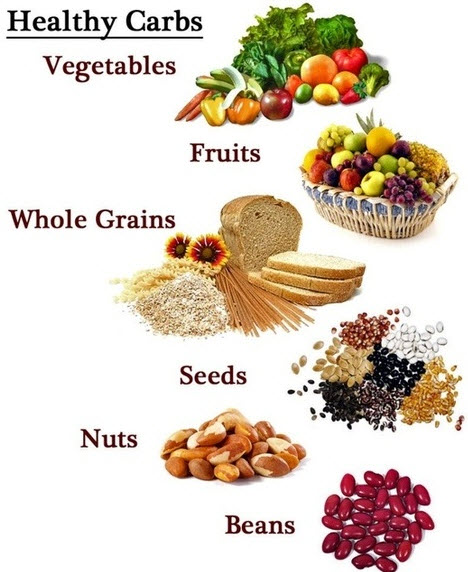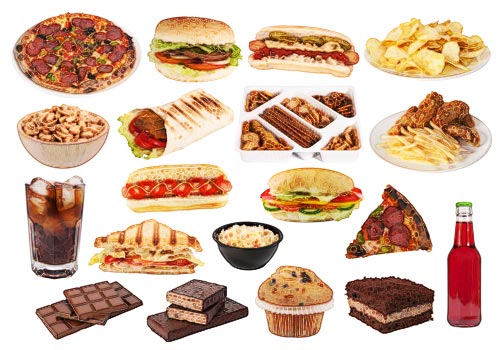Carbohydrates are essential nutrients which provide fuel and energy for the body to perform day to day activities, they are essential for development, growth and a strong immune system. These days many people have the misconception that carbohydrate consumption can lead to weight gain and they avoid taking carbohydrates in adequate amounts, which can lead to carbohydrate deficiency and can result in serious health problems.
Symptoms of Carbohydrate Deficiency
Carbohydrates play a vital role in maintaining normal body function. The symptoms of carbohydrate deficiency can be transient and short lived or more long term based on the extent of deficiency. Since they are the major energy suppliers to the brain cells, a lack of them can result in lack of concentration and can affect memory and learning abilities. Since the brain cells work all the time they are in constant need of a steady glucose supply. Severe carbohydrate deficiency can lead to serious problems like seizures or paralysis.
Main symptoms of carbohydrate deficiency are:
 Exhaustion, fatigue and irritability
Exhaustion, fatigue and irritability- Headache
- Nausea
- Muscle ache and cramps
- Smelly breath
- Lack of concentration and mental sharpness
- Dehydration
- Altered bowel habits (diarrhea or constipation)
- Sodium deficiency
- Vitamin and mineral deficiency
- Increased lipid levels in blood
An adequate intake of carbohydrates is necessary for proper metabolism and optimal functioning of human body.
What Happens With Carbohydrate Deficiency?
Ideally 45-65% of daily caloric intake should be derived from carbohydrates. The body converts all carbohydrates into glucose which acts as the basic fuel for the body and provides all the energy required for normal body functions. Lack of carbohydrates can lead to carbohydrate deficiency and can cause following problems.
1. Hypoglycemia
It is very important to have normal blood glucose level, when the glucose level in blood drops below normal value it is called low blood glucose or hypoglycaemia. Hypoglycaemia is generally seen in diabetics but it can happen if adequate amounts of carbohydrates are not consumed because all carbohydrates are converted into glucose. Hypoglycaemia can cause a feeling of dizziness, lethargy, confusion and triggers hunger. It can be corrected by eating small amounts of carbohydrate or glucose rich food immediately.
2. Ketosis
When the body does not have adequate supply of carbohydrates to produce energy, it starts breaking down the fats to meet the metabolic demands. Ketones are produced in the process of fat breakdown and an excessive amount of ketones in blood is termed as ketosis, mild ketosis can cause nausea, headache, smelly breath and metal fatigue whereas severe ketosis can seriously damage the vital organs. The minimum amount of carbohydrates required by the body is 130 gm per day and an intake of 225 to 325 gm of carbohydrates every day is recommended to avoid ketosis.
3. Weight Gain
Carbohydrates are generally avoided for the fear of weight gain but it is a scientifically proven fact that severe restriction of carbohydrates is not very helpful in losing weight. Carbohydrate deficiency triggers hunger and leads to extra calorie consumption. Taking adequate amounts of low calorie, healthy carbohydrates keeps you full for longer and produces early satiety with the high fibre content. According to a recent research people who ate recommended amounts of complex carbohydrates are more likely to reduce weight and maintain it as compared to those who consume no carbohydrates.
Remedies to Help
 Carbohydrate deficiency can be easily sorted by increasing the amount of carbohydrates in diet. The recommended daily intake of sugar should not exceed 9 teaspoons for men and 6 teaspoons for women each day. It is essential to have healthy carbs to maintain body weight and have great energy levels.
Carbohydrate deficiency can be easily sorted by increasing the amount of carbohydrates in diet. The recommended daily intake of sugar should not exceed 9 teaspoons for men and 6 teaspoons for women each day. It is essential to have healthy carbs to maintain body weight and have great energy levels.
The main sources of complex carbohydrates are grains and vegetables like potatoes. Dairy products also contain some carbohydrates. Carbohydrates derived from plant sources like fruit, vegetables, grains and legumes are preferred as they are rich in fibre and provide a steady supply of glucose over a longer period of time, making you feel fuller for longer.
Carbs to Limit
 It is very important to take adequate amount of carbs but to avoid the bad carbs. The bad carbs, or refined sugars and grains should be limited because they have very less nutritional value and only provide calories. These include sugar which is hidden in many products like desserts, drinks, sweets and processed food and refined grains like white bread and pasta.
It is very important to take adequate amount of carbs but to avoid the bad carbs. The bad carbs, or refined sugars and grains should be limited because they have very less nutritional value and only provide calories. These include sugar which is hidden in many products like desserts, drinks, sweets and processed food and refined grains like white bread and pasta.
Carbohydrates obtained from sugar, bread or other processed and refined foods immediately increase the blood glucose level but they are rapidly metabolized and the blood glucose level drops rapidly after some time of consumption and you can feel hungry soon after taking them.
